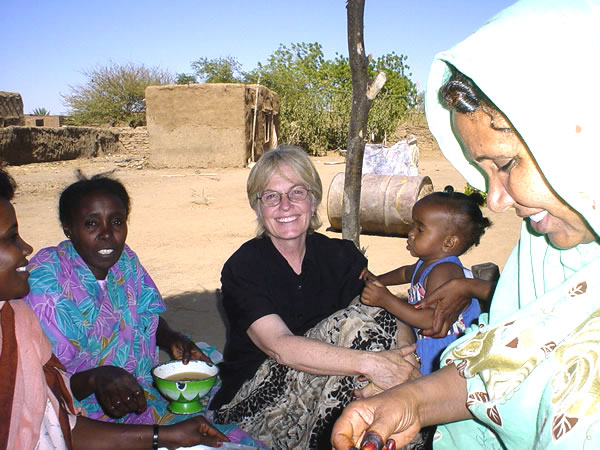Medical Anthropologist Speaks on Abolishing Female Circumcision

09/21/2010
Ellen Gruenbaum, who has conducted research in Sudan and Sierra Leone on the practice of female genital cutting and the social movements against “harmful traditional practices,” will discuss her work on Wednesday, Sept. 29.
A professor and chair of the Anthropology Department at Purdue University, she will begin her lecture on “Secrets, Fear, Honor and Outrage: Challenges to Abolishing Female Genital Cutting” at 4:30 p.m. in Moffett Center, Room 2125.
Presented as part of the 2010-11 Rozanne M. Brooks Lecture Series themed, “Women’s Worlds Redux,” the event is free and open to the public. A reception to welcome Gruenbaum starts at 4 p.m. at the Rozanne M. Brooks Museum in Moffett Center, Room 2126.
A medical anthropologist drawing on more than five years of fieldwork in Sudan, where the most severe forms of genital surgery are common, Gruenbaum shows that the practices of female circumcision are deeply embedded in Sudanese cultural traditions — in religious, moral, and aesthetic values, and in ideas about class, ethnicity, and gender.
“I will examine the validity of Western arguments against female circumcision,” said Gruenbaum, the author of The Female Circumcision Controversy: An Anthropological Perspective. “In doing so, I will explore both outsider and insider perspectives on the custom, concentrating on the complex attitudes of the individuals and groups who practice it and on indigenous efforts to end it.”
In her book, The Female Circumcision Controversy, Gruenbaum points out that Western outrage and Western efforts to stop genital mutilation often provoke a strong backlash from people in the countries where the practice is common.
“The criticisms of outsiders are frequently simplistic and fail to appreciate the diversity of cultural contexts, the complex meanings and the conflicting responses to change,” she observed.
Gruenbaum’s research strives to illuminate both the resistance to and the acceptance of change, which occurs as the result of economic and social developments, the influences of Islamic activists, the work of Sudanese health educators, and the efforts of educated African women.
“That does not mean that there is no role for outsiders,” asserts Gruenbaum, who will offer suggestions for those who wish to help facilitate change.
By presenting specific cultural contexts and human experiences with a deep knowledge of the tremendous variation of the practice and meaning of female circumcision, Gruenbaum seeks to provide an insightful analysis of the process of changing this complex, highly debated practice.
Gruenbaum earned a Bachelor of Arts in Anthropology from Stanford University and master’s and doctoral degrees from University of Connecticut. She previously served as professor of anthropology and dean of the College of Social Sciences at California State University at Fresno. Gruenbaum has held teaching positions at California State University at San Bernardino, University of Wisconsin College in Manitowoc and the University of Khartoum in Sudan.
A former research consultant to UNICEF, her interest in the controversies among cultural self-determination, international human rights and women’s rights led to her past service on the Committee for Human Rights of the American Anthropological Association and the Association for Feminist Anthropology.
She currently serves as the secretary of the Society for Medical Anthropology. Gruenbaum also is the author of numerous articles and chapters and serves on the editorial advisory board of The Journal of Middle East Women’s Studies.
The Brooks Lecture Series is sponsored by a grant from Auxiliary Services Corporation (ASC) and the Cortland College Foundation. For more information, contact organizer Brooks Museum Director Sharon R. Steadman at (607) 753-2308.

